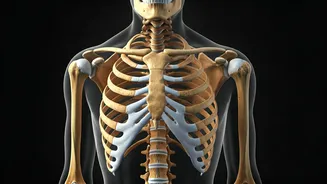Muscle Issues Arise
One of the earliest and most noticeable signs of low calcium levels involves the muscles. Individuals may start experiencing frequent muscle cramps, which
are sudden, involuntary contractions that can be painful. Along with cramps, muscle spasms might occur, leading to uncontrollable twitching or jerking movements. These symptoms arise because calcium plays a vital role in muscle contraction and relaxation. A deficiency disrupts this process, causing muscles to become overstimulated or unable to function correctly. This can cause discomfort, and if left unattended, these problems can impact daily activities.
Numbness & Tingling Feelings
Another prominent symptom associated with calcium deficiency involves neurological issues, specifically affecting the nerves. Many individuals may encounter paresthesia, a medical term for numbness and tingling sensations. These sensations commonly manifest in the hands, feet, and face, often resembling the pins and needles feeling. This happens due to calcium's role in nerve signal transmission. Inadequate levels of calcium can impair these signals, disrupting the communication between the brain and the body's extremities. These neurological symptoms often appear gradually, which can make early detection of calcium deficiency difficult, but it's important to recognize them to take preventive measures.
Skeletal Pain & Weakness
Calcium is a fundamental building block for strong bones and teeth, so calcium deficiency can significantly impact the skeletal system. Insufficient calcium can lead to bone pain, which might be constant or intermittent, depending on the severity of the deficiency. Moreover, the lack of calcium can weaken bones, making them more susceptible to fractures. Prolonged calcium deficiency can contribute to issues such as osteoporosis, where the bones become porous and fragile. Dental problems can also surface, including tooth decay and increased risk of gum disease. Maintaining adequate calcium intake is crucial to preserve bone strength and overall skeletal health.
Cognitive Issues Appear
Calcium deficiency may also affect cognitive functions, potentially leading to mood changes and cognitive disturbances. Individuals might experience irritability, anxiety, or depression as calcium impacts neurotransmitter function. Memory problems and difficulty concentrating can also surface as a result of calcium deficiency. The brain needs a steady supply of calcium to work properly, and when levels are insufficient, it can negatively impact various cognitive processes. Such symptoms may affect someone's work, relationships, and general quality of life. It’s important to monitor these subtle changes and seek medical advice if they persist.
Fatigue & Physical Weakness
Calcium deficiency often leads to fatigue, a state of persistent tiredness and lack of energy. This can affect daily routines and overall well-being. Individuals may also feel general weakness, where their muscles are not able to perform at their best. This weakness might make everyday tasks like walking, lifting objects, or even getting out of bed seem difficult. Brain fog, a state of mental confusion and inability to concentrate, is another frequent symptom. When the body lacks adequate calcium, various metabolic processes get affected, including energy production and efficient cognitive function. It is important to address these fatigue-related problems by identifying the root cause and making changes to improve calcium levels.
Skin, Hair, Nail Changes
Physical changes to the skin, hair, and nails can also suggest calcium deficiency. Brittle nails, which break or chip easily, may be a sign of inadequate calcium. Likewise, dry skin may be apparent, as calcium contributes to skin hydration and health. Hair changes might also be observed, with the hair becoming dry, thin, and prone to breakage. Calcium plays a role in cell growth and repair, which affects these structures, and a shortage of it can show externally. Observing changes in the appearance of the skin, hair, and nails may provide valuable clues when diagnosing calcium deficiency.
Heart Rhythm Irregularities
Calcium deficiency can have severe implications for cardiovascular health. One of the most dangerous potential effects is the development of heart rhythm irregularities. Calcium is critical for the proper functioning of the heart muscle, and a lack of it can disrupt the electrical signals that regulate heartbeats. This can lead to arrhythmias, which are irregular heartbeats that may range from harmless to life-threatening. Severe calcium deficiencies can potentially result in other heart problems as well, such as prolonged QT intervals, and a significant risk of cardiac arrest. Therefore, addressing calcium deficiency is critical to protecting overall cardiovascular health.
Breathing Issues Develop
In severe instances, calcium deficiency can impact respiratory function. The muscles that control breathing, like the diaphragm and the intercostal muscles, also depend on calcium for proper functioning. If calcium levels are low, these muscles may become weak or unable to contract properly, resulting in breathing difficulties. This could manifest as shortness of breath, wheezing, or even more severe respiratory problems. It's crucial to seek medical attention immediately if you experience breathing difficulties, particularly if accompanied by other symptoms. Early intervention is very important to avoid potentially serious and possibly fatal complications.
Esophageal Spasms & Others
Calcium deficiency may also cause less common yet troublesome symptoms like esophageal spasms, which are involuntary contractions of the esophagus, causing discomfort and pain. Chvostek's sign, which is characterized by twitching of the facial muscles, and Trousseau's sign, which involves carpopedal spasm induced by inflating a blood pressure cuff, are other indicators that might appear. These signs occur because calcium is important for the normal functioning of nerves and muscles. They are useful clues in the diagnostic process. Their presence emphasizes the importance of a thorough assessment to address any underlying causes.





















